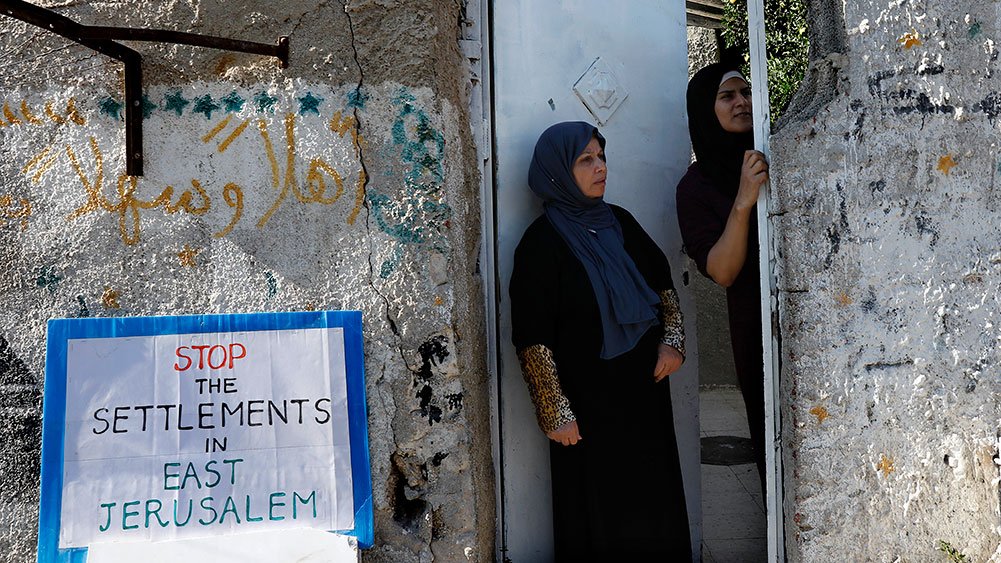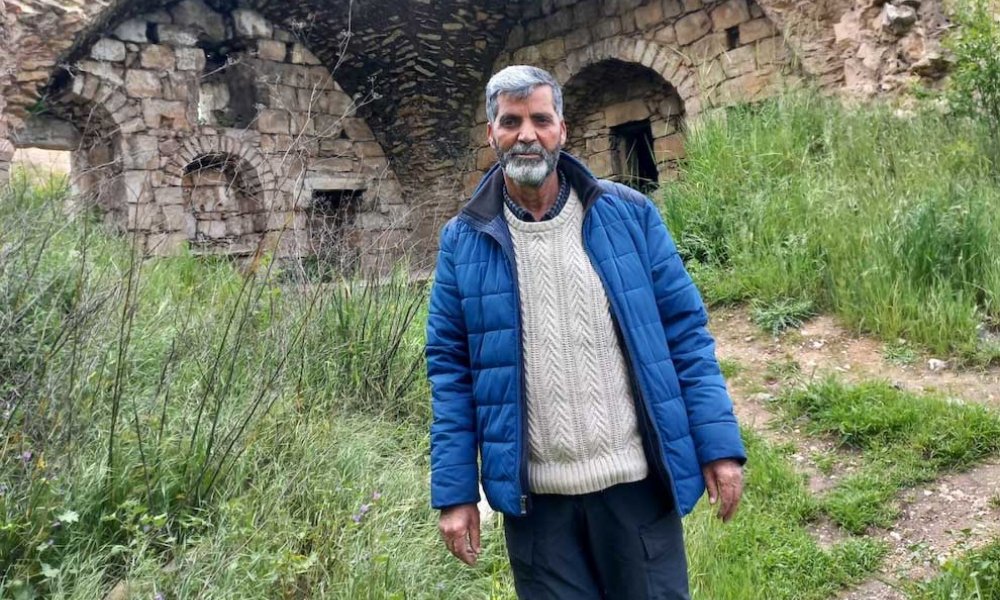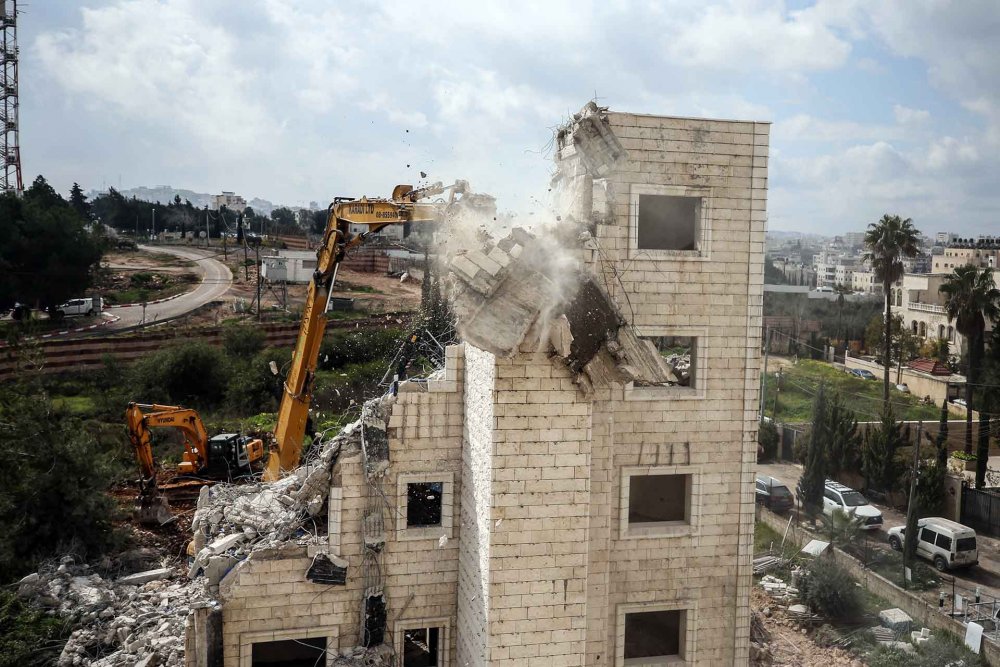Introduction

Credit:
Gali Tibbon/AFP via Getty Images
Palestinian Advocate Zakaria Odeh: “Injustice, Colonization, and Occupation Can’t Last Forever”
Zakaria Odeh is the executive director of the Civic Coalition for Palestinian Rights in Jerusalem (CCPRJ), which he joined in 2009. Highly qualified in law, particularly international law, and politics, Zakaria has dedicated his life to challenging Israeli occupation and protecting Palestinian civil and human rights in Jerusalem and beyond. He was born in Jerusalem to a family from Lifta, a Palestinian village on the western outskirts of Jerusalem that was forcibly depopulated in 1948. Zakaria’s family fled from the western side of Lifta to Ramallah and then to the Old City of East Jerusalem in 1948.
Zakaria studied politics and law in Baghdad, Iraq, and completed a master’s degree in international law at the London School of Economics. He then went on to complete a second master’s in social and economic development at the University of Salford in Manchester, England, and a postgraduate diploma in international law and development. He returned to Jerusalem in 1995, where he began his career advocating for Palestinian rights, and soon became a well-known figure in the community for supporting countless causes, including the Sheikh Jarrah case, the case of al-Bustan, Silwan, and other cases.
The CCPRJ was established in 2005 to mobilize civil society to combat Israeli policies that undermine Palestinian rights, identity, and presence in East Jerusalem. It is a nongovernmental nonprofit coalition of around 22 institutions, societies, associations, and individuals with experience working in and protecting human rights in Jerusalem. Their mission is “to mobilize efforts, capacities, and resources to protect the political, civil, economic, social, and cultural rights of Palestinians in Jerusalem based on international law and human rights law.”1
On May 27, 2024, Jerusalem Story spoke with Zakaria about the organization, the challenges it is currently facing, and how it continues to serve and support the Palestinian population of Jerusalem against all odds.
Jerusalem Story: What were your early roles?
Zakaria Odeh: When I returned to Jerusalem, I worked at Bisan Center for Research and Development, where I managed the capacity-building department for civil society. We used to do consultancy for different civil NGOs in Jerusalem and Ramallah and these areas. Then I worked in the United Nations Development Programme (UNDP), managing a program in poverty alleviation for almost five years.
JS: When did you start with the Civic Coalition?
ZO: I started with the Civic Coalition in 2009. I am the executive director of the coalition. We are a coalition of 22 NGOs focused on occupied [East] Jerusalem and on the human rights situation. The coalition was established in 2005 by several civil society organizations in the city, because the situation in occupied [East] Jerusalem is a little different from the rest of the occupied West Bank and Gaza. The challenges are huge in Jerusalem. So, these NGOs came together to establish a consortium. They called it a coalition, and since then, it was expanded to 22 organizations—not all based in Jerusalem, but they have a program in Jerusalem. Most of them do work in occupied [East] Jerusalem although they are not based there.
JS: What do you do as a coalition?
ZO: As a coalition, we do several things. We monitor the Israeli policies, practices, procedures, laws, and plans for [East] Jerusalem. We monitor the various Israeli institutions—mainly the municipality of Jerusalem, the different ministries, the Israeli planning committees—and we try to monitor the plans and policies for occupied East Jerusalem. As well, we monitor the violations in occupied East Jerusalem.
Then we go one step further by doing awareness raising for the various neighborhoods in East Jerusalem to inform people about these policies, laws, and plans. If there is a plan that will affect a particular neighborhood, we go and talk to the neighborhood about it and discuss the impact of the plan and what action we can take together.
After we raise awareness, we do legal intervention. We have a team of three lawyers. They are not in-house, but they take cases [for the coalition]. We provide legal aid for Palestinian neighborhoods in occupied East Jerusalem for public and general cases, not individual cases, to support the people to stay on their land. We work on cases such as Sheikh Jarrah, the cable car in al-Bustan, Silwan, the national park in al-‘Isawiyya. We try to provide legal aid to challenge the Israeli plans to try and support the people.
We also work to promote and protect the national identity of Palestine. Our main focus here is education in East Jerusalem, because it has been targeted by the Israeli authorities since 1967. They’re trying to control education, because it is one of the mechanisms used to control the Palestinian national identity—the culture, the narrative, the thinking. We call it the occupation of the mind, and this is more dangerous and worse than taking land and demolishing homes. You can rebuild a house, but if they destroy how people think, it is very dangerous. They’re trying to wipe out the Palestinian history, narrative, and culture from the consciousness of the new generation. In the last 10 or 15 years, they’ve been focusing a lot on controlling the education system, imposing the Israeli curriculum, and trying to force the schools not to use the Palestinian curriculum and textbook.
This is one of the main battles for years, as well as settlement expansion and land control, restriction in building, home demolition in East Jerusalem. So, education has always been one of the main targets of the Israeli government.
The last thing we do is international legal advocacy. We must use the Israeli legal system, though we don’t believe it is a just system. The law is the occupation law; the judges are all Israeli; so is the prosecutor. The whole legal system is the system of the Israeli occupation, so how can we expect it to be fair and just? But we have to use it.
ZO: One of the main objectives of the legal intervention is to buy time. Instead of demolishing a house in six months, let’s delay it for five, six years. If they plan to confiscate land in one year or less, maybe we can make it five to ten years. Maybe [in that time] we can stop them from taking the land; maybe we can reduce the amount of land they are taking. For example, the Sheikh Jarrah eviction order has been in place for 52 years, since 1972. Can you imagine? And the people are still there. As a legal institution, we see this as an achievement—to keep the people in their houses, in their land, for 10, 15, 20 years.
That’s why the main thing we do is international legal advocacy, because we believe the problem in Jerusalem and everywhere is the Israeli settler–colonial apartheid system. It is a political issue, not an issue of a school here, a house there, or a road. No, it is a larger issue of occupation, colonization, discrimination—all these together. And if we want to solve it, we have to solve all three. Otherwise, as I tell our European supporters, I tell them, “You help us to manage the occupation, not to end the occupation.” So, we work intensively in advocacy. We work a lot with the UN mechanisms. We work with the UN Human Rights Council, United Nations and committees, the Special Rapporteur, and other mechanisms to write and submit reports and participate in forums. And we do a lot of work with the EU and the European Parliament. We work with diplomatic missions here in Palestine, because we believe advocacy is one of our main components as a coalition that we are working on, because our problem is political.
So, this is what we are doing.
JS: What have been your biggest achievements?
ZO: One of the main achievements is raising awareness. We have some legal achievements, but not many. It’s very difficult to change anything in the Israeli legal system; you can only delay things; it’s very difficult to cancel. But raising awareness is very important, and we worked on the Sheikh Jarrah case, which we followed since 2008. People lived there since 1956; Jordan gave the land, and the United Nations Relief and Works Agency for Palestine Refugees in the Near East (UNRWA) financed the building of the housing project. There were 28 families; now, after 75 years, there’s 75 families, and the only evictions happened in 2008 and 2009, when the Israeli government evicted 13 families out of the 75. So, we follow this case and raise awareness and advocate for it. I call it the “protection cycle” that we go through in our advocacy: It’s monitoring, documenting, and research; then you go to awareness raising in the community; then you go to legal aid; then international legal advocacy.
For example, in the case of settlements, we have experts who monitor the situation on the ground, we get the maps, we put the map of the plan on aerial photos, we know which area this plan will be implemented on, then we find the people who are affected and we discuss with them the impact of the plan on the land and try to decide what to do, and use legal advocacy as well.
JS: How large is the Civic Coalition and where do you get your funding?
ZO: We are six staff people in the organization. We used to have international volunteers but not these days. In addition, we have the three lawyers, but they are not in-house, they work case by case. We have been funded by the UNDP and different international NGOs, some European countries such as Norway, and some Arab funds.
JS: What new challenges are you facing since Israel’s war on Gaza began on October 7, 2023?
ZO: There’s been a lot of restrictions on people. There’s been the war in Gaza and another war on people in the West Bank in different ways. There’s a big increase in settlement plans in East Jerusalem and the rest of the West Bank; there has been a big increase in home demolitions that we have never seen before. Restriction of movement and access from Jerusalem—you know at the beginning of the war, they nearly closed East Jerusalem. There was only one checkpoint where we could go out and in. It used to take five or six hours just to get from Bethlehem or Ramallah to East Jerusalem. They increased the checkpoints, tightened more the checkpoints that are already there. They closed some checkpoints. So, movement has been very bad, especially in the first few months.
But the biggest change has been restrictions on freedom of expression. They’ve been controlling social media; they’re checking people’s social media accounts at checkpoints, especially if they’re young. They take their phones and check what they’ve been writing. Hundreds if not thousands of people were arrested. According to some statistics, nearly 2,700 people have been arrested in occupied East Jerusalem since October 7, 2023, most, if not all, because of their use of social media.
Even by Israeli law, you need a court order to open someone’s telephone and check it. Some people were punished for watching a video. They expanded the incitement law, and imprisonment can now be from one to five years, just for what you watch or like or post on social media.
And the conditions of the prisons have been very bad since October 7, 2023. There’s a shortage of food and blankets; some people couldn’t change their clothes for months in detention. There’s harassment; they’re being beaten, abused, humiliated. Since 1967, the conditions have never been as bad as they are now.
JS: How does this affect the social fabric in Jerusalem?
ZO: People have stopped using social media because of that. They [the authorities] have all these systems to monitor your phone, your computer, and people’s freedom of expression is really restricted.
Also, the economic situation in Jerusalem has been really, really bad. The economy here depends on people who come from other cities, but they closed East Jerusalem. They closed the Old City for the first few months. They had police at the gates, and you couldn’t enter unless you have an ID that shows you live in the Old City. It affected people who go to the holy places to pray. Even people over 60, 65 were not allowed to enter al-Aqsa Mosque—it’s never been as bad as that. These closures have really affected the commercial life of East Jerusalem. In the first four or five months, nearly 70 percent of the shops in the Old City were completely closed. The economy has been devastated. Even now 50 percent are completely closed.
JS: How are people surviving economically?
ZO: Unemployment has increased; poverty has increased. The shopkeepers don’t have customers, and of course there are no tourists. In Jerusalem, especially the Old City, a lot depends on tourism, and since the war there hasn’t been any. They can’t afford to pay for the electricity, the water, the daily expenses, so they said, why should we open? A lot of them have closed.
It’s not just in Jerusalem. Unemployment has tripled over the last eight months. Even the people who work for the PA as civil servants have no salaries. You can imagine, when most of the people in the rest of the West Bank work in either the PA or for Israeli projects—if these two main groups lose their jobs, you can imagine.
It affects everything—the social fabric, the relations among people. People here in East Jerusalem have families in the rest of the West Bank, and they don’t see each other so often partly because of the economic situation and partly because of the restrictions. A lot of universities are doing long-distance teaching partly because of the restrictions and checkpoints, but partly because people can’t afford to pay for transport to get to university. The solution they found is long-distance learning. So, this has also affected the education system as well.
JS: What is the Civic Coalition’s main focus now?
ZO: During the war, we have been mainly monitoring all the plans. We have a specialist working with us on the settlement plans, and we’re monitoring demolitions. We did a lot of work raising awareness among youth about these new Israeli laws, especially around incitement and how to use social media. We’re working with the Ministry of Education, with schools, students, teachers, and counsellors, and reporting to the international mechanisms.
JS: What gives you hope?
ZO: History shows that injustice will not continue. Injustice, colonization, occupation—all these things can’t last forever. At the end, freedom and liberation will take place. It might take a long time; it has been a long time; it’s very costly, very painful, especially with what’s happening now in Gaza. The cost is very high, but peace, independence, and freedom will take place one day.
Notes
“Civic Coalition for Palestinian Rights in Jerusalem,” Jerusalem Story, accessed June 1, 2024.


